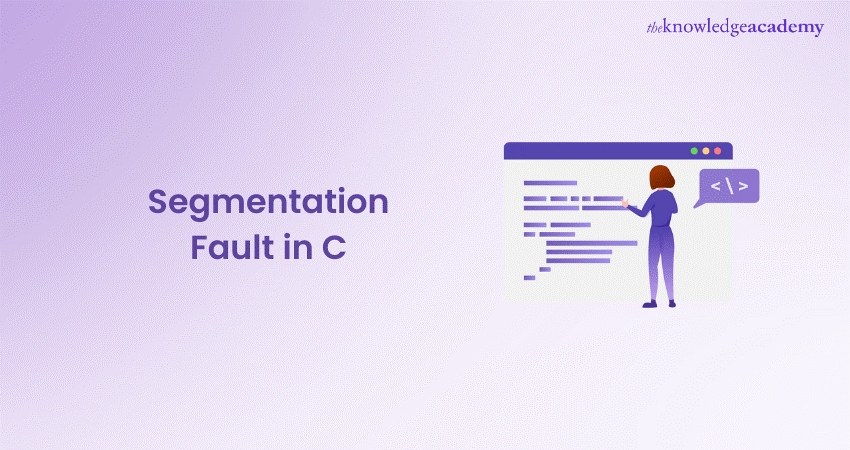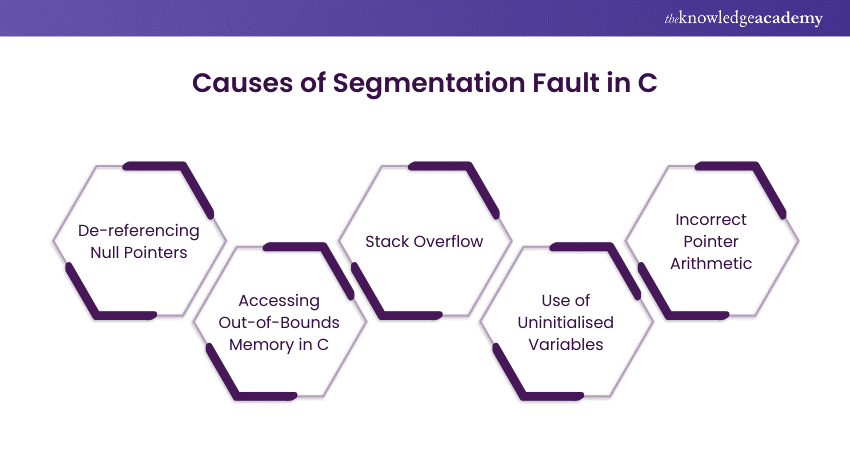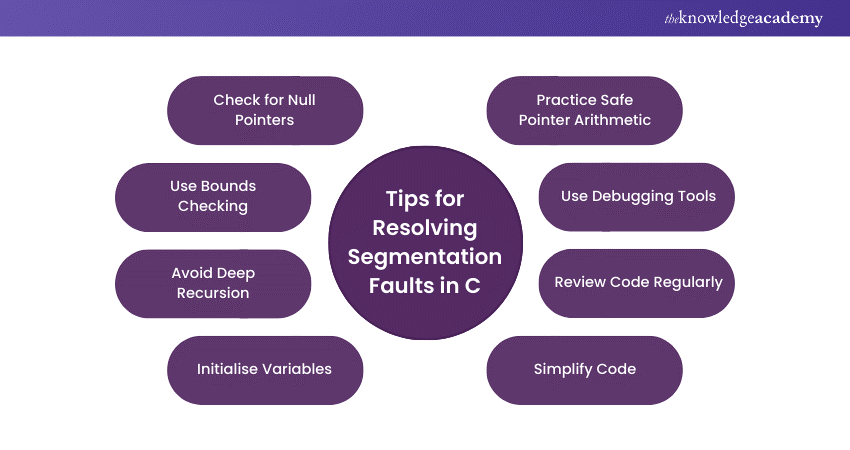We may not have the course you’re looking for. If you enquire or give us a call on +61 272026926 and speak to our training experts, we may still be able to help with your training requirements.
Training Outcomes Within Your Budget!
We ensure quality, budget-alignment, and timely delivery by our expert instructors.

Are you starting with C programming? If so, you might stumble upon a perplexing issue known as a Segmentation Fault. This error can leave even seasoned developers puzzled. Grasping the concept of Segmentation Fault in C is essential for crafting robust and error-free code.
In this blog, we’ll explain what causes Segmentation Fault in C and how to fix them. Let’s make your programming journey smoother by tackling this issue together!
Table of Contents
1) What is the Segmentation Fault in C
2) Common Causes of Segmentation Fault in C
3) How to Debug a Segmentation Fault in C?
4) Tips for Diagnosing and Resolving Segmentation Faults in C
5) Conclusion
What is the Segmentation Fault in C?
A Segmentation Fault, often referred to as a "segfault," occurs when a program attempts to access an illegal or restricted area of memory. In C, effective memory management is crucial, yet it can also lead to significant challenges.
When a Segmentation Fault occurs, it typically means the program is trying to access memory, which it’s not allowed to use. This often results in the program crashing or behaving unpredictably. Understanding the causes of Segmentation Faults and how to prevent them is key to developing reliable C programs.
Common Causes of Segmentation Fault in C
Segmentation faults are common in C, especially for beginners. They often result from errors in memory handling, which can be complex in C. Below are some of the most frequent causes of segmentation faults in C.

1) De-referencing Null Pointers
Dereferencing a null pointer is a common mistake in C programming. A null pointer does not point to any valid memory location. Attempting to access or modify the data it points to will cause the program to crash as it tries to interact with non-existent memory. To avoid this, always check whether a pointer is null before using it.
2) Accessing Out-of-Bounds Memory in C
Exceeding the bounds of an array in memory is another common cause of segmentation faults. Arrays in C have fixed sizes, and accessing an index outside this range leads to undefined behaviour, which can corrupt data, cause crashes, or both. Ensure that any loop or function accessing array elements remains within the array’s limits.
3) Stack Overflow
A stack overflow occurs when a program uses more stack space than what’s available. This often happens in cases of deep or infinite recursion, where function calls keep piling up on the stack. Since the stack has a limited size, exceeding this limit will result in a segmentation fault. Review recursive functions carefully to ensure they have a clear base case to prevent this.
4) Use of Uninitialised Variables
Uninitialised variables in C can lead to unpredictable behaviour, including segmentation faults. When a variable is declared but not initialised, it holds an undefined value. If this value is used as a memory address, especially with pointers, it can cause a segmentation fault. Always initialise variables before use to prevent such issues.
5) Incorrect Pointer Arithmetic
Pointer arithmetic is powerful in C but is also a common source of errors. Miscalculating pointer offsets can lead to accessing invalid memory areas, causing segmentation faults. This often occurs when manipulating pointers without considering the size of the data types they point to. Ensure correct calculations and understand how pointers work to mitigate these errors.
Boost your career with our comprehensive C Programming Training. Sign up today and code like a pro!
How to Debug a Segmentation Fault in C?
Debugging segmentation faults can be challenging but is essential for resolving underlying issues. The first step is to use debugging tools like GDB (GNU Debugger). GDB allows you to run your program in a controlled environment, where you can inspect its state at the point of the crash.
By analysing the stack trace, you can identify the specific origin and cause of the segmentation fault. Additionally, using memory analysis tools like Valgrind can help detect invalid memory accesses, uninitialised memory usage, and memory leaks, making it easier to pinpoint the source of the fault.
Learn the Language that Powers the Tech World. Join our C programming Course and Code like a pro! - Register now.
Tips for Diagnosing and Resolving Segmentation Faults in C
Diagnosing and resolving Segmentation Faults requires a systematic approach. Here are some tips to help you effectively handle these errors:

a) Check for Null Pointers: Always validate pointers before using them to prevent many segmentation faults.
b) Use Bounds Checking: Ensure all array accesses are within defined bounds. Consider using safe alternatives or manually checking indices.
c) Avoid Deep Recursion: Monitor recursive functions to ensure they don’t run indefinitely. Set limits on the depth of recursion if possible.
d) Initialise Variables: Always initialise your variables, especially pointers, before use. This practice prevents accessing random memory locations.
e) Practice Safe Pointer Arithmetic: Be aware of the data types involved and calculate offsets correctly when manipulating pointers.
f) Use Debugging Tools: Utilise debugging tools like GDB and Valgrind to gain insights into the location and cause of segmentation faults.
g) Review Code Regularly: Regular code reviews can help identify potential sources of segmentation faults before they cause problems.
h) Simplify Code: Simplifying complex code, especially when it involves pointer manipulation or recursion, can reduce the likelihood of segmentation faults.
Unlock your Coding Potential and Build Robust Applications with our Expert-led C# Programming (C Sharp) Course. Start today!
Conclusion
Understanding and resolving Segmentation Fault in C programming is crucial for developing reliable and efficient code. By identifying common causes and applying practical solutions, you can significantly reduce these errors and enhance your coding skills. Keep experimenting, stay curious, and remember that every challenge is an opportunity to learn and grow.
Elevate your coding journey! Join in our C++ Programming (C Plus Plus) Course and turn your passion into powerful programming skills.
Frequently Asked Questions

Handle Segmentation Faults by checking for null pointers, ensuring array bounds, initialising variables, and using correct pointer arithmetic. Employ systematic debugging techniques to identify and fix the root cause of the fault.

GDB (GNU Debugger) is commonly used to find Segmentation Faults. It allows you to trace the program's execution, inspect variables, and pinpoint where the fault occurs, helping you diagnose and fix the issue.

The Knowledge Academy takes global learning to new heights, offering over 30,000 online courses across 490+ locations in 220 countries. This expansive reach ensures accessibility and convenience for learners worldwide.
Alongside our diverse Online Course Catalogue, encompassing 19 major categories, we go the extra mile by providing a plethora of free educational Online Resources like News updates, Blogs, videos, webinars, and interview questions. Tailoring learning experiences further, professionals can maximise value with customisable Course Bundles of TKA.

The Knowledge Academy’s Knowledge Pass, a prepaid voucher, adds another layer of flexibility, allowing course bookings over a 12-month period. Join us on a journey where education knows no bounds.

The Knowledge Academy offers various C Programming Courses, including the C Programming Course, C++ Programming Course, and Introduction Of Embedded C Programming Course. These courses cater to different skill levels and provide comprehensive insights into C vs Java.
Our Programming & DevOps Blogs cover a range of topics related to Programming & DevOps, offering valuable resources, best practices, and industry insights. Whether you are a beginner or looking to advance your Programming & DevOps Skills, The Knowledge Academy's diverse courses and informative blogs have got you covered.
Upcoming Programming & DevOps Resources Batches & Dates
Date
 C Programming
C Programming
Thu 16th Jan 2025
Thu 6th Mar 2025
Thu 22nd May 2025
Thu 24th Jul 2025
Thu 25th Sep 2025
Thu 20th Nov 2025
Thu 11th Dec 2025







 Top Rated Course
Top Rated Course



 If you wish to make any changes to your course, please
If you wish to make any changes to your course, please


